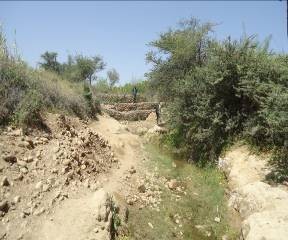
In northern Ethiopia, the rocky, dry Tigray region experiences high food insecurity and frequent shocks. In Mereb Leke wareda, a district within Tigray region, roughy a third of the population of 117,000 lives below the poverty line and produces only about a third of their annual food needs. They get by through market purchases and food received through a social safety net program.
The Productive Safety Net Program, or PSNP, was launched by the Government of Ethiopia in 2005 to help food-insecure families access food 12 months a year and protect community assets through public works projects. USAID is one of nine donors funding this program.
Although most of total wareda’s population is engaged in either crop production or livestock rearing, they earn little income. Land is degraded as a result of deforestation and poor land management practices. On top of that, farmers have to rely on unpredictable rainfall that typically comes just four months of the year. Recently life has been particularly difficult, with frequent severe drought leaving farmers with little crops to harvest.
War has compounded the degree of food insecurity. Mereb Leke shares a border with Eritrea, and since the war broke out in 1998, the area has suffered from border insecurity that has blocked access to trade routes and pasture and water for livestock. Thousands of households are still recovering from the war.
Since 2005 the local NGO Relief Society of Tigray (REST) has implemented a USAID safety net program which reduces the chronically poor’s profound vulnerability to disaster and shocks.
Ato Berhane Teklu lives in a village located in Tabia Bershiwa, in Ethiopia. He has two sons and two daughters between the ages of 9 and 23. His primary source of income prior to 2005 was one acre of rain-fed land, which did not produce well. In 2005, Teklu got paired up with the USAID program in his village and embarked on an ambitious gully reclamation project to save his farmland from the devastating effects of erosion.
Drawing on all available family labor, he was able to successfully turn his life around.
Teklu began treating the gullies after participating in the public works undertaken as part of the Productive Safety Net Program (PSNP) in his village. Teklu explains, “My farmland was located adjacent to an expanding gully. As I have personally witnessed the effectiveness of gully treatment work done under the program, I asked the program task force in our village to consider this site for rehabilitation. Unfortunately however, they declined to prioritize it, saying there are other sites with higher risk of erosion. I then came up with another option – to mobilize all the labor needed myself, while the task force could help me with technical support and non-local inputs. Fortunately, they accepted this option and supported me.”
Using this self-initiated approach, Teklu constructed four small dams across the gullies that were 60 meters long. Gradually, the gully started to fill up with fertile soil layers, enabling full recovery of once degraded, marginal lands. In the long term, this gully reclamation will reduce Teklu’s vulnerability to low rainfall and drought conditions, key for families regularly impacted by drought.
Teklu later gained access to water from a constructed irrigation scheme in his village. “My farm is now totally under irrigation. Water is supplied by a river diversion developed by the program. I now have 80 papayas, 50 grafted mangos and 40 oranges trees stretched over a quarter hectare of land. Wherever I can, I also grow a variety of vegetables.”
Teklu graduated from the program in December 2011. Since then he has been helping the task force in promoting graduation in his village. Graduation from the PSNP takes place when a household is able to meet its food needs for all 12 months of the year without safety net transfers, and can withstand modest shocks such as a short-term drought.
The program, which focuses on various ways to rehabilitate natural resources, is currently being implemented in 545 watersheds across Tigray to help bring sustained relief to more than 705,000 people. In Mereb Leke alone, from 2009 to 2012 more than 27,000 people have graduated and can meet their food needs year round.







Comment
Make a general inquiry or suggest an improvement.